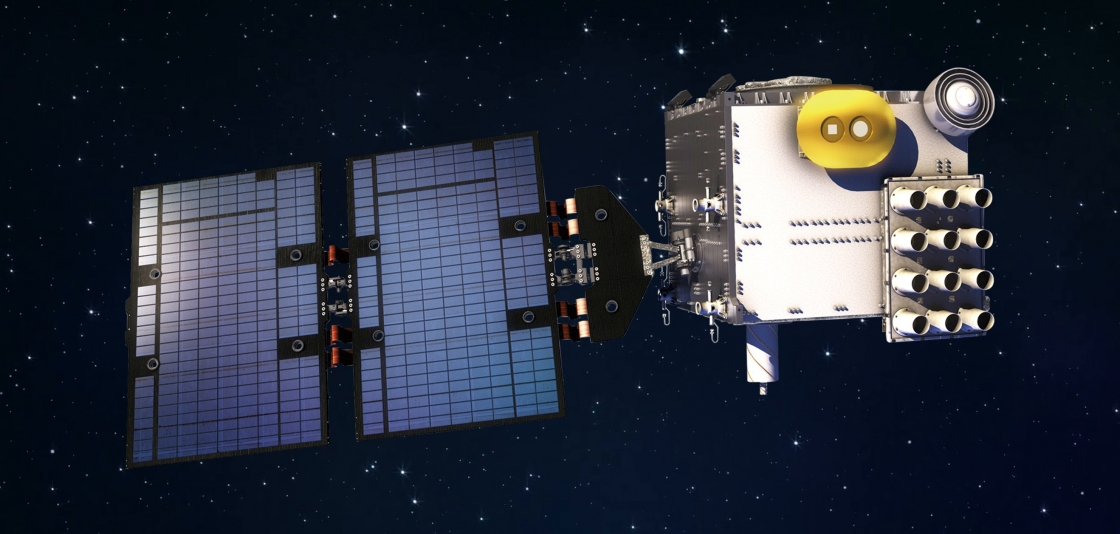COSMIC-2 Satellites Soar into Orbit Aboard SpaceX Falcon Heavy Rocket
Special Stories
27 Jun 2019 1:45 AM
[A SpaceX Falcon Heavy rocket carrying 24 satellites, 6 for weather, as part of the Department of Defense's Space Test Program-2 (STP-2) mission launches from Launch Complex 39A at NASA's Kennedy Space Center in Florida Tuesday morning, June 25, 2019. The satellites include four NASA technology and science payloads that will study non-toxic spacecraft fuel, deep space navigation, "bubbles" in the electrically-charged layers of Earth's upper atmosphere, and radiation protection for satellites. Credits: NASA/Joel Kowsky]
[NOAA] COSMIC-2, a mission of six satellites designed to improve weather forecasts and space weather monitoring, blasted into orbit at Thursday morning from Cape Canaveral, Florida, aboard a SpaceX Falcon Heavy rocket.
 [COSMIC-2 spacecraft image. From NOAA]
The satellites, six of the 24 payloads flying on the U.S. Air Force’s Space Test Program-2, make up the Constellation Observing System for Meteorology, Ionosphere, and Climate, called COSMIC-2. The mission is part of a joint agreement between the American Institute in Taiwan and the Taipei Economic and Cultural Representative Office in the United States, with NOAA and the Taiwan National Space Organization, as designated representatives. In Taiwan, COSMIC-2 is known as FORMOSAT-7 and the satellites are owned and operated by the authorities in Taiwan.
“The critical atmospheric data from COSMIC-2, along with information from polar-orbiting satellites NOAA and its international partners operate, will go a long way toward improving the accuracy of our forecasts and reduce the harmful impacts on lives, property, and economies,” said Neil Jacobs, Ph.D., acting NOAA administrator.
[COSMIC-2 spacecraft image. From NOAA]
The satellites, six of the 24 payloads flying on the U.S. Air Force’s Space Test Program-2, make up the Constellation Observing System for Meteorology, Ionosphere, and Climate, called COSMIC-2. The mission is part of a joint agreement between the American Institute in Taiwan and the Taipei Economic and Cultural Representative Office in the United States, with NOAA and the Taiwan National Space Organization, as designated representatives. In Taiwan, COSMIC-2 is known as FORMOSAT-7 and the satellites are owned and operated by the authorities in Taiwan.
“The critical atmospheric data from COSMIC-2, along with information from polar-orbiting satellites NOAA and its international partners operate, will go a long way toward improving the accuracy of our forecasts and reduce the harmful impacts on lives, property, and economies,” said Neil Jacobs, Ph.D., acting NOAA administrator.
“The COSMIC satellites launched today will play a critical role for forecasters and scientists,” said Secretary of Commerce Wilbur Ross. “With advanced modeling technology and new satellites in orbit to call upon, NOAA is better prepared than ever to predict and respond to threatening weather phenomenon.”
 [COSMIC-2 spacecraft image. From NOAA]
The satellites, six of the 24 payloads flying on the U.S. Air Force’s Space Test Program-2, make up the Constellation Observing System for Meteorology, Ionosphere, and Climate, called COSMIC-2. The mission is part of a joint agreement between the American Institute in Taiwan and the Taipei Economic and Cultural Representative Office in the United States, with NOAA and the Taiwan National Space Organization, as designated representatives. In Taiwan, COSMIC-2 is known as FORMOSAT-7 and the satellites are owned and operated by the authorities in Taiwan.
“The critical atmospheric data from COSMIC-2, along with information from polar-orbiting satellites NOAA and its international partners operate, will go a long way toward improving the accuracy of our forecasts and reduce the harmful impacts on lives, property, and economies,” said Neil Jacobs, Ph.D., acting NOAA administrator.
[COSMIC-2 spacecraft image. From NOAA]
The satellites, six of the 24 payloads flying on the U.S. Air Force’s Space Test Program-2, make up the Constellation Observing System for Meteorology, Ionosphere, and Climate, called COSMIC-2. The mission is part of a joint agreement between the American Institute in Taiwan and the Taipei Economic and Cultural Representative Office in the United States, with NOAA and the Taiwan National Space Organization, as designated representatives. In Taiwan, COSMIC-2 is known as FORMOSAT-7 and the satellites are owned and operated by the authorities in Taiwan.
“The critical atmospheric data from COSMIC-2, along with information from polar-orbiting satellites NOAA and its international partners operate, will go a long way toward improving the accuracy of our forecasts and reduce the harmful impacts on lives, property, and economies,” said Neil Jacobs, Ph.D., acting NOAA administrator.
The COSMIC-2 satellites will undergo an early check-out, calibration, and validation process for approximately seven months before their data are declared operational. It will take up to 20 months from launch before all six satellites reach their final orbit configuration.
https://www.youtube.com/watch?v=1IIec34Ukjg&feature=youtu.be The COSMIC-2 satellites, each about the size of a standard kitchen oven, will orbit Earth near the equator, taking measurements of the tropics and subtropics and monitoring the ionosphere for the effects of solar storms. Using a technique called radio occultation, the satellites will collect signals from the Global Navigation Satellite System, (including the U.S. Global Positioning System or GPS) that are “bent” as they travel through the Earth’s atmosphere. The bent signal gives scientists an indication of the temperature, pressure and moisture content of the atmosphere. COSMIC-2 data will be fed into NOAA’s sophisticated numerical weather prediction models to forecast weather and climate and monitor dynamic changes in Earth's ionosphere, leading to improved weather and space weather forecasts. For WeatherNation: Meteorologist Mace MichaelsAll Weather News
More